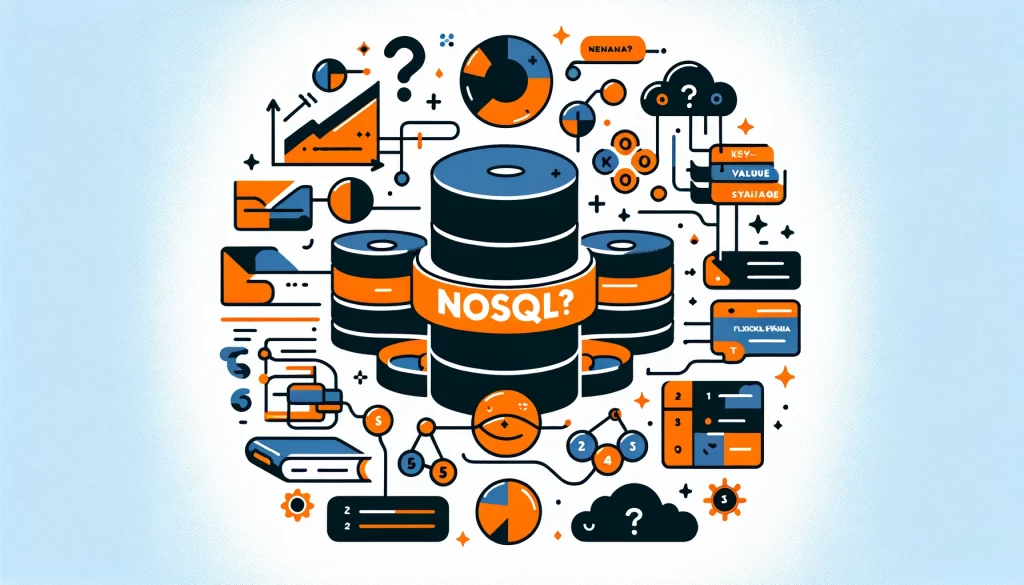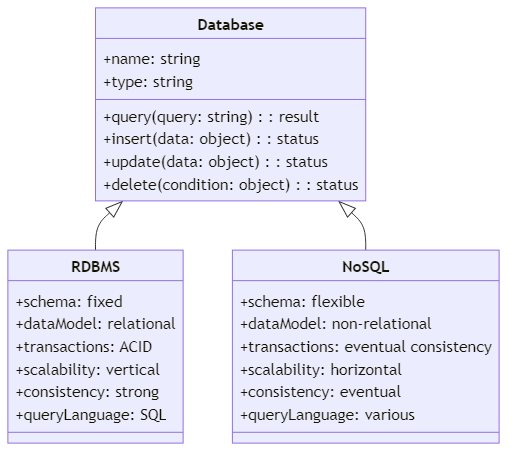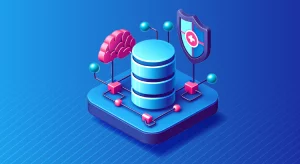
What is NoSQL? Understanding Non-Relational Databases and Their Advantages

In context of data management, NoSQL databases have emerged as a powerful alternative to traditional relational databases. Organizations face challenges managing large amounts of unstructured data. NoSQL databases provide a scalable, flexible, and high-performance solution for handling this data. This guide will explain NoSQL databases, their main features, and give examples to show how they work.
Understanding NoSQL Databases
NoSQL, short for “Not Only SQL,” includes various database technologies that are different from traditional relational databases with tables. NoSQL databases can handle a lot of different types of data and can scale up easily. They break away from the rigid schema constraints of relational databases, allowing for more agile and adaptable data models.
Key Characteristics of NoSQL Databases

Key Differences of SQL and NoSQL
Schema Flexibility
One of the defining characteristics of NoSQL databases is their schema flexibility. Unlike relational databases, which enforce a predefined schema, NoSQL databases allow for a more dynamic and flexible data structure. This lets you save info without a fixed structure, making it easy to adapt to changing data requirements.
For example, consider a social media application that stores user profiles. In a database, there is a specific layout with columns for name, age, location, and interests. A NoSQL database stores each user profile as its own document, with different attributes and structures.
One profile may have social media links or blog URLs, while another profile may not have certain fields at all. This flexibility enables you to accommodate diverse and changing data needs without the need for complex schema migrations.
Horizontal Scalability
NoSQL databases enable horizontal scaling, allowing them to distribute data across multiple servers seamlessly. This ability to scale out allows NoSQL databases to handle massive amounts of data and high traffic loads effortlessly. As your data grows, you can simply add more servers to your NoSQL database cluster to accommodate the increased demand.
To illustrate this, let’s consider an e-commerce platform that experiences a surge in traffic during peak shopping seasons. In a relational database, handling more data usually means upgrading to a stronger server.
However, with a NoSQL database, you can easily distribute the data across multiple servers, allowing for horizontal scaling. Each server can manage some data and traffic. If demand increases, you can add more servers to keep performance and availability high in the cluster.
High Performance
NoSQL databases are great for fast reading and writing, making them perfect for web apps, content networks, and handling data. They achieve this through various techniques, such as data sharding, in-memory caching, and eventual consistency models.
For example, think about a live analytics dashboard showing current data for a large set of information. Apache Cassandra spreads data across nodes for quick querying and parallel processing in a cluster. Cassandra can handle a lot of writing and update data quickly. This is thanks to its column-family data model and eventual consistency model.
Types of NoSQL Databases
NoSQL databases come in various flavors, each designed to cater to specific use cases and data models. Let’s explore the four main types of NoSQL databases in more detail:
Document Databases
Document databases, such as MongoDB and Couchbase, store data in a document-oriented format, typically using JSON or BSON. Each document is self-contained and can have its own unique structure, allowing for flexible and hierarchical data storage.
Example MongoDB Query:
db.users.find({ age: { $gt: 25 }, interests: "travel" })
This search finds all documents in the “users” collection where the person is over 25 years old and likes to travel. The flexibility of the document model allows for complex queries and easy retrieval of nested data.
Key-Value Stores
Key-value stores, such as Redis and Amazon DynamoDB, are the simplest type of NoSQL database. They store data as a collection of key-value pairs, where each key is unique and maps to a specific value. Key-value stores are good for quickly and efficiently storing data. They are ideal for tasks such as caching, session management, and real-time data processing.
Example Redis Query:
HSET user:1 name "John Doe" age 30
This query sets the fields “name” and “age” for the hash stored at key “user:1”. Redis’ simple key-value structure allows for efficient storage and retrieval of data.
Columnar Databases
Columnar databases, also known as wide-column stores, organize data into columns rather than rows. They quickly search and combine large sets of data, which makes them perfect for analyzing and storing data. Apache Cassandra and Apache HBase are popular examples of columnar databases.
Example Cassandra Query:
SELECT name, age FROM users WHERE city = 'New York';
This query retrieves the “name” and “age” columns from the “users” table where the “city” column equals “New York.” Cassandra’s columnar structure allows for efficient retrieval of specific columns, reducing disk I/O and improving query performance.
Graph Databases
Graph databases, such as Neo4j and Amazon Neptune, focus on storing and querying data based on relationships between entities. Nodes and edges in a graph help organize data, making it easier to search and navigate through intertwined information.
Example Neo4j Query:
MATCH (u:User)-[:FRIENDS_WITH]->(f:User)-[:LIKES]->(p:Product) WHERE u.name = 'Alice' RETURN f.name, p.name
This query finds all users who are friends with “Alice,” and returns the names of those friends along with the products they like. Graph databases excel at handling complex relationships and performing deep traversals of connected data.
Benefits and Use Cases of NoSQL
NoSQL databases offer numerous benefits and are well-suited for various use cases:
- Scalability and High Traffic: NoSQL databases can handle massive amounts of data and high traffic loads by distributing data across multiple servers. They are ideal for social networks, content management systems, and real-time analytics platforms that need to scale easily.
- Flexibility and Agility: The schema-less nature of NoSQL databases allows for flexible data modeling and easy accommodation of evolving data requirements. This makes them suitable for agile development environments and applications with rapidly changing data structures.
- Real-Time Processing: NoSQL databases excel at handling real-time data processing and providing fast read and write operations. Applications that need instant updates, like stock tickers, sensor monitoring, and live chat systems, often use them.
- Big Data and Analytics: NoSQL databases are well-suited for storing and processing large volumes of unstructured and semi-structured data. They are great for analyzing data, logs, and machine learning because they can handle complicated queries and aggregations.
Conclusion
NoSQL databases have reinvented the way we store, manage, and process data in the modern era. NoSQL databases are great for managing data because they can handle different types of data, scale easily, and work efficiently. Their flexibility makes them crucial in data management.
Discover different types of NoSQL databases and their unique features. This will assist you in selecting the most suitable one for your requirements. NoSQL databases can meet your needs for real-time applications and relationship management. Choose the right one for your project.
Data is growing rapidly and the demand for flexible solutions is increasing. NoSQL databases will play a crucial role in managing data in the future. Using NoSQL technology can help organizations unleash their data’s full potential, foster innovation, and stay competitive in their industry.
